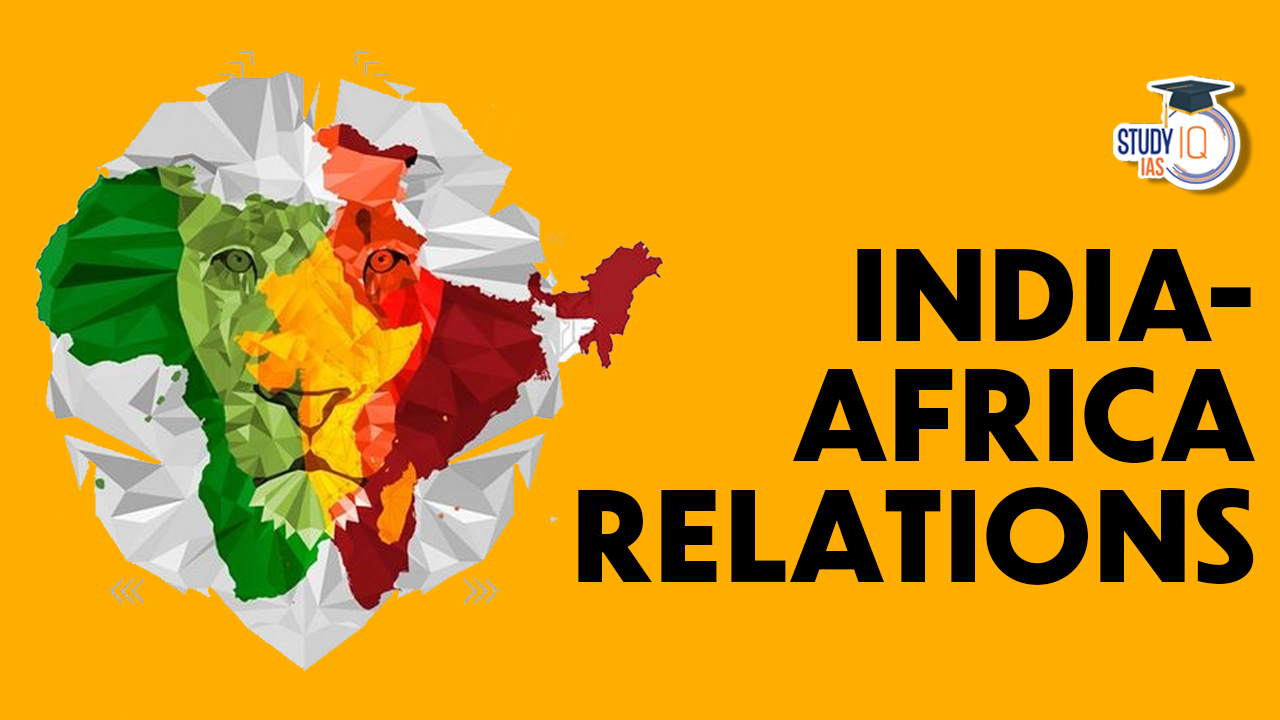Table of Contents
Context: India’s External Affairs Minister, during his address at the 18th CII-EXIM Bank Conclave on India-Africa Growth Partnership in Delhi, stated that the rise of Africa is crucial for global rebalancing, and that India is committed to long-term engagement with Africa to promote capabilities and create capacities.
More on the News
- In the meeting, India reaffirmed its commitment to Africa and highlighted the importance of the rise of Africa in global rebalancing.
- India’s focus on promoting capabilities and creating capacities in Africa, emphasizing the need for a development partnership based on the needs and priorities of African countries was highlighted.
- India’s significant financial assistance to Africa, including concessional loans amounting to over $12.37 billion, the completion of 197 projects in various sectors, such as drinking water, irrigation, rural solar electrification, and transmission lines were also discussed.
- These projects have not only generated local employment but also improved the lives of many people in Africa.
- Added to this, India’s assistance and partnership with Africa during the COVID-19 pandemic, India’s support in encouraging pharmaceutical and vaccine manufacturers to explore joint manufacturing facilities in African countries is also noteworthy.
- The discussions also focussed on the future of India-Africa partnership that will be centred around digital, green, health, food, and water sectors, which are considered pressing priorities for Africa.
India-Africa Ties
Evolution of Ties:
- Historical Ties: India and Africa have a long history of interaction, primarily through trade routes connecting the Indian Ocean region and the East African coast. This historical connection forms the basis of cultural and people-to-people ties that continue to influence contemporary relations.
- Decolonization and South-South Cooperation: Following the wave of decolonization in Africa during the mid-20th century, India played a significant role in supporting African nations’ struggles for independence. India’s own experience of colonial rule resonated with African nations, leading to the establishment of strong diplomatic and political ties. India’s leaders, such as Mahatma Gandhi and Jawaharlal Nehru, played a crucial role in fostering solidarity and cooperation between India and Africa.
- Non-Aligned Movement (NAM): Both India and many African countries were founding members of the Non-Aligned Movement, which emerged during the Cold War era. NAM aimed to provide a platform for countries to maintain neutrality and pursue their own development agendas, free from the influence of major power blocs. This common alignment fostered cooperation and diplomatic engagements between India and Africa.
Areas of Cooperation
Cooperation between India and Africa spans across various areas, driven by shared interests, historical ties, and the recognition of mutual benefits.
- Economic Cooperation:
- Trade and Investment: India has been one of the major investors in Africa, with investments in sectors such as telecommunications, energy, infrastructure, agriculture, and manufacturing. Both sides aim to enhance bilateral trade and diversify their economic ties.
- Energy Security: India seeks to secure its energy supplies by partnering with African countries in the oil and gas sector. This includes long-term contracts for oil and gas imports and collaboration in renewable energy projects.
- Agriculture and Food Security: India looks to leverage Africa’s ample agricultural land to address its own food security concerns. There is potential for cooperation in areas such as agricultural research, technology transfer, and capacity building.
- Mining and Mineral Resources: African countries, rich in mineral resources, have historic ties with India in this sector. India’s industries rely on African resources like iron, copper, aluminium, and zinc.
- Development Cooperation:
- Capacity Building and Human Resource Development: India offers scholarships, training programs, and technical assistance to African countries to enhance their human resource capabilities in sectors such as healthcare, education, information technology, and agriculture.
- Infrastructure Development: India supports infrastructure projects in Africa through aid and concessional loans. These projects focus on areas such as transportation, power generation, telecommunications, and water management.
- Health and Pharmaceuticals: India provides medical expertise, pharmaceuticals, and affordable healthcare solutions to African countries. This includes partnerships in research and development, manufacturing, and supply of essential medicines.
- Political and Diplomatic Cooperation:
- UN and International Forums: India and African countries collaborate and support each other on various international platforms, including the United Nations, to address common challenges and promote shared interests.
- Peacekeeping and Security: India has been actively involved in UN peacekeeping operations in African countries, contributing troops and sharing its expertise in capacity building, training, and conflict resolution.
- Climate Change and Sustainable Development: India and Africa cooperate in addressing climate change, promoting sustainable development, and implementing global agreements such as the Paris Agreement. They advocate for the concerns of developing and least developed countries in international climate conferences.
- Cultural and People-to-People Exchanges:
- Soft Power and Cultural Exchange: India’s soft power, including its diverse culture, traditional medicine, and yoga, plays a significant role in building bridges and strengthening ties with African countries.
- Indian Diaspora: The presence of the Indian diaspora in several African countries acts as a bridge between the two regions, facilitating cultural understanding, economic collaboration, and people-to-people connections.
Regional Groupings and Forums for India-Africa Relations
- India-Africa Forum Summit (IAFS): The IAFS is a major platform for India-Africa cooperation. It is a summit-level meeting held periodically to enhance and strengthen the partnership between India and African countries. The first IAFS was held in 2008 in New Delhi, and subsequent summits have been held in Africa.
- BRICS (Brazil, Russia, India, China, South Africa): India and Africa engage through the BRICS platform, which is a grouping of five major emerging economies. BRICS provides opportunities for economic cooperation, trade, and investment between India and African countries.
- Asia-Africa Growth Corridor (AAGC): The AAGC is an economic cooperation agreement between India and Japan aimed at promoting socio-economic development in Asia and Africa. It focuses on infrastructure development, digital connectivity, and capacity building in African countries.
- International Solar Alliance (ISA): The ISA is an initiative launched by India and France to promote solar energy deployment globally. It provides a platform for collaboration and technology transfer in the field of solar energy, including for African countries.
- India-Africa Science and Technology Initiative (IASTI): The IASTI is an initiative that promotes cooperation between India and African countries in the field of science and technology. It includes various programs and activities to support research and capacity building in science and technology.
- Regional Economic Communities (RECs): Africa has several RECs, such as the Economic Community of West African States (ECOWAS), Southern African Development Community (SADC), East African Community (EAC), and others. India engages with these regional groupings to promote trade, investment, and cooperation in various sectors.
Challenges in India-Africa Relations
- Competition with China: China has established a significant presence in Africa, particularly in sectors like infrastructure, mining, and energy. India faces competition from China in terms of investment, trade, and influence in Africa.
- Limited Resources: India’s resources for providing financial assistance and infrastructure development in Africa are comparatively limited. India cannot match China’s vast financial capabilities, which can result in challenges in competing for major projects and trade opportunities.
- Investment Concerns: Indian firms may be hesitant to invest in Africa due to concerns about slower economic growth, high levels of debt, and uncertainties in some African countries’ business environments. These factors can limit India’s ability to expand its economic footprint in the continent.
- Lack of Connectivity: Adequate city-to-city connectivity between India and Africa is lacking, hindering people-to-people contact and impeding the growth of mutual understanding and cooperation.
- Perception and Image: India needs to address concerns among African citizens who view Indian investments as neo-colonialism or exploitative. Incidents of racial attacks on African nationals in India have damaged India’s image and could potentially strain relations.
- Implementation Challenges: India faces challenges in terms of slow delivery and low disbursement rates of commitments made to African countries. The reliance on multilateral agencies for project implementation sometimes leads to India not receiving proper credit for its contributions.
- Different Priorities: India’s focus on Africa is not its primary foreign policy priority, as it also engages with other major powers like the United States, the European Union, and neighboring countries. Balancing multiple priorities can pose challenges in effectively pursuing India-Africa relations.


 Serious Fraud Investigation Office (SFIO...
Serious Fraud Investigation Office (SFIO...
 Article 142 of Indian Constitution, Sign...
Article 142 of Indian Constitution, Sign...
 Pakistan-Occupied Kashmir (PoK): History...
Pakistan-Occupied Kashmir (PoK): History...





















